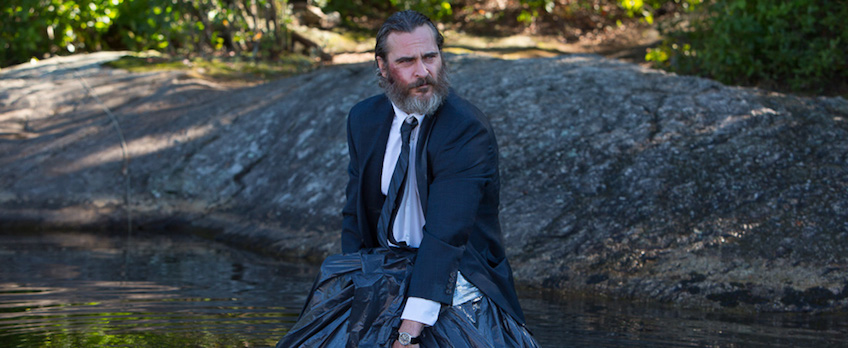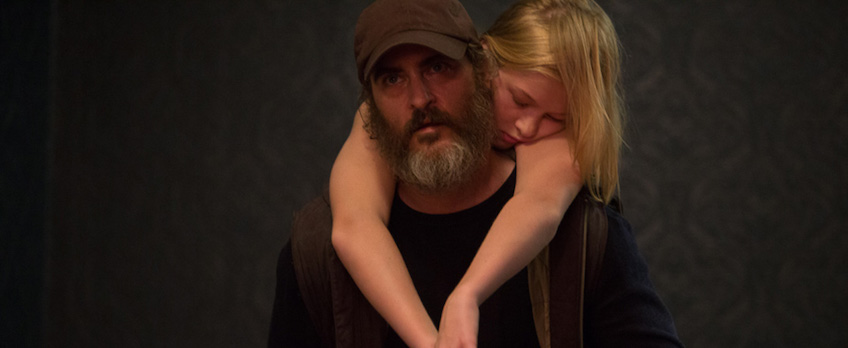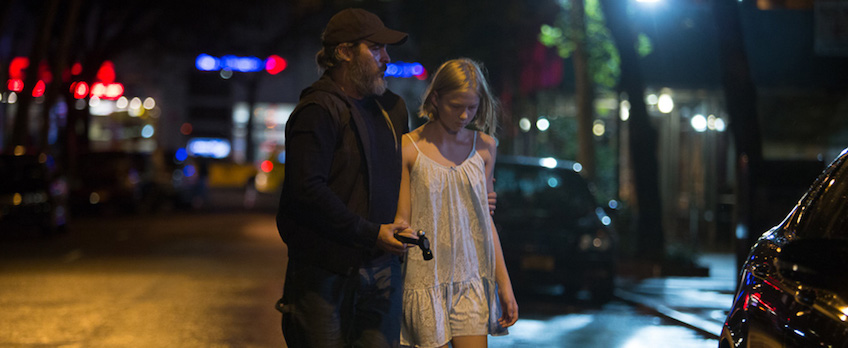Interested in writing for our blog? Send your pitches to editor@miff.com.au.
It’s Like He Was Never Really Here: How Lynne Ramsay Externalises Inner Trauma in You Were Never Really Here

By Debbie Zhou
Lynne Ramsay’s fourth and newest feature, You Were Never Really Here, opens with scarred and pitted anti-hero Joe (Joaquin Phoenix) mid-suffocation, as his face breathes into plastic. It’s a jarring shot that bears resemblance to the opening of Ramsay’s first feature Ratcatcher (MIFF 2000), where a young boy entangles himself within translucent curtains. Both shots introduce deformed images of faces confined behind semi-opaque masks, instilling the idea that you can be here and viscerally present – while also being there – partially hidden and somehow trapped. Ratcatcher's James seeks a childhood escape from his poverty-stricken Glaswegian home, but Joe’s desire for escape is both more extreme and more perilously internalised. So although Ramsay's eye for images frequently turns grisly in the depiction of onscreen violence, the real violence takes place off-screen, unseen within the characters' minds. Here, she deploys her signature command over the poetic image as a blunt-force weapon to make manifest her characters' inner trauma, and so invests an already bleak premise with even more dislocation and darkness.
Like her previous films (Ratcatcher, Morvern Callar (MIFF 2003), We Need to Talk About Kevin) with their eloquently wordless aesthetic, You Were Never Really Here exists in an accumulation of visual details. The earliest indication of Joe’s unorthodox occupation, as a hired gun who specialises in visiting bloody violence on the perpetrators of child sexual abuse, comes to us in fragments: A necklace that reads ‘Sandy’; a deep-focus shot of a burning photograph, with the face of a young girl bubbling and warping under the flame; Joe wiping blood off his trademark hammer. In contrast to these staccato shots, elsewhere the camera glides between and through spaces, often rooted to the back of Joe's head as though we're woozily experiencing his alienation from his surroundings along with him. A single tracking shot stalks Joe's path through the hallways of a dingy hotel and into the dizzying darkness of the city, where violence hides, inevitably yet unexpectedly, in scuzzy alleyways.

You Were Never Really Here
The camera revels in the pulpy, slick, neo-noir metropolitan settings, but the jagged editing by Ramsay and editor Joe Bini also seems to mimic the rhythms of Joe's shattered psyche. Shards of memories evoke his post-traumatic stress disorder, hinting at his troubled experience in the military and an earlier abusive childhood – the past back there insistently thrusts itself into the present, right here. These flashbacks are as fleeting as they are sensory: a foot rubbing against sand; a hand passing a chocolate bar through a fence; a woman cowering under a table while metal utensils clatter all around. The shots flicker like unbidden, short-circuiting thoughts through Joe's mind.
The film has been likened to Martin Scorsese’s Taxi Driver – unsurprisingly given how its genre conventions align with a similar masculine brutality. But unlike the progressively more deranged Travis Bickle, in You Were Never Really Here, Joe's violence is the counter-expression of an increasingly fragile vulnerability, demonstrated in moments of tenderness that provide respite from the violence of the film elsewhere. Underneath the seemingly robust demeanour of this hefty figure, there's a Joe who is devoted to his elderly mother. Their sweetly domestic relationship even gives the film some wryly funny moments – references to Hitchcock’s Psycho (1960); an impromptu duet warbled while polishing cutlery; Joe's gentle exasperation at finding her fridge stocked with expired cheese. Ramsay’s unexpected humour unearths a suppressed humanity in her gruff, hardened leading man, but if his childhood home serves as a temporary comfort for him, it’s also a place of vulnerability.
Ultimately the safety of home proves to be as illusory as the flashbacks that plague Joe – as real and yet unreal. And these intrusive memories affect the way he interacts with people. His handler, John McCleary (John Doman) paints a lush picture of the reward that will come after the next job: “You, me, a couple of steaks, a couple of beers.” But Joe’s face stays blank. Maybe he doesn’t quite grasp the concept of socially acceptable pleasures; maybe he's so distracted by the thoughts in his head that John might as well be speaking a foreign language. That spinning foreignness descends again later when a bunch of girls ask him to take a picture: all those open-mouthed grins, and forced, public jollity are alien to Joe, who scarcely smiles once throughout the film.

You Were Never Really Here
It’s perhaps why Joe bonds so readily with the subject of his new mission, Nina (Ekaterina Samsonov), the abducted daughter of a New York Senator. Before we meet Nina in her drugged, laid-out state in a brothel, we hear her coping mechanism – barely-audible whispers of a numerical countdown – against the film’s opening black screen. In Paul Davies’ subjective sound mix, her breathy voice cuts through Joe’s own reminders of his past: the sound of overhead war planes, a voice demanding he “stand up straight”, and his own countdown that alludes to a later scene where his and Nina’s voices meld into one. Nina buries the brunt of her suffering beneath an eerily placid, glassy-eyed surface, her numbers are spoken with a careful, even rhythm – as though the slightest error could trigger a breakdown of the barriers she has built to protect herself from the ugliness of her circumstances. Their recovery journeys parallel each other: Ramsay blurs the line between their perspectives to confuse where Joe's trauma ends and Nina’s begins.
Despite separate terrors, the film’s most unnerving joins are sewn together by Joe and Nina’s shared struggles. This enables them to locate a space where they can both belong: one where trauma still exists, but the present can be acknowledged. In a final scene set in a diner, Nina remarks that it is a “beautiful day” to Joe’s agreement. In this moment, Ramsay yields a hopeful outlook for her damaged characters – where a future can be imagined, and a present unshadowed by the past can be glimpsed.